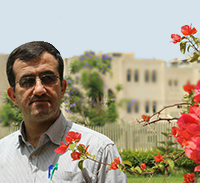Those, who do not make attempt, do not feel comfortable
Hamid Ghazvini
Translated by: Fazel Shirzad
2020-4-14
 ■The song of change and renewal of nature is heard from every direction, and spring presents its beauties.
■The song of change and renewal of nature is heard from every direction, and spring presents its beauties.
The air became Jesus, breath, and the dust, musk-diffusing
Green, the tree became; and into song the bird came[1]
(Hafez Shirazi)[2]
This spring, slowly and drunkenly, along with Eid al-Maba'ath[3] is celebrated, and it is a link between Iranian culture and prophetic tradition and bring a monotheistic worldview for all.
I'm happy in the world because the world is flourish from God
I love all the world because the world come from God[4]
(Saadi Shirazi)
Unfortunately, Iranian people, these days, have an uninvited stranger and gust, which has caused their suffering and sadness; it is an in interloper that sometimes results in death. This ominous gust tries to influence the spring and push away the happiness and flourishing. That is why, the first days of New Year have a different color and smell. On the one hand, pain, fever and shortness of breathiness, and on the other hand, sacrifice, resistance and service of members of the Health Front who have kept hope alive. This honor country has been repeatedly attacked by impostors and vulgarisms and enormous costs has been imposed to it , but Iran and Iranian people persist and continue to evolve. The life history of Iranian residents have shown that they were always defending themselves against any aggression targeted their nature and essence; thy used it as an opportunity to grow. That is why, I believe that Iran's cultural and civilizational background is a valuable asset to overcome this crisis.
For the next few weeks, the Corona virus will left here, and these hard times will be ended. On that day, another glorious page will be added to the Iranian life history. This time is an important experience in storing the knowledge of the people of this country.
Do not complain about the sadness in the way of desire
Those, don’t make attempt, don’t feel comfortable
(Hafez Shirazi)
[1]Original Translated by Wilberforce Clarke (1870-1905).
[2] He, known by his pen name Hafez and as "Hafiz", was a Persian poet who "lauded the joys of love and wine but also targeted religious hypocrisy".
[3] That is, Muhammad's revelation, an event described in Islam as taking place in 610 AD, during which the Islamic prophet, Muhammad was visited by the archangel Jibrīl, known as Gabriel in English, who revealed to him the beginnings of what would later become the Qur’an.
[4] This poem has been written by Saadi, also known as Saadi of Shiraz, was a major Persian poet and prose writer of the medieval period. He is recognized for the quality of his writings and for the depth of his social and moral thoughts
Number of Visits: 2757








The latest
Most visited
Attack on Halabcheh narrated
With wet saliva, we are having the lunch which that loving Isfahani man gave us from the back of his van when he said goodbye in the city entrance. Adaspolo [lentils with rice] with yoghurt! We were just started having it when the plane dives, we go down and shelter behind the runnel, and a few moments later, when the plane raises up, we also raise our heads, and while eating, we see the high sides ...The Arab People Committee
Another event that happened in Khuzestan Province and I followed up was the Arab People Committee. One day, we were informed that the Arabs had set up a committee special for themselves. At that time, I had less information about the Arab People , but knew well that dividing the people into Arab and non-Arab was a harmful measure.Kak-e Khak
The book “Kak-e Khak” is the narration of Mohammad Reza Ahmadi (Haj Habib), a commander in Kurdistan fronts. It has been published by Sarv-e Sorkh Publications in 500 copies in spring of 1400 (2022) and in 574 pages. Fatemeh Ghanbari has edited the book and the interview was conducted with the cooperation of Hossein Zahmatkesh.Is oral history the words of people who have not been seen?
Some are of the view that oral history is useful because it is the words of people who have not been seen. It is meant by people who have not been seen, those who have not had any title or position. If we look at oral history from this point of view, it will be objected why the oral memories of famous people such as revolutionary leaders or war commanders are compiled.

